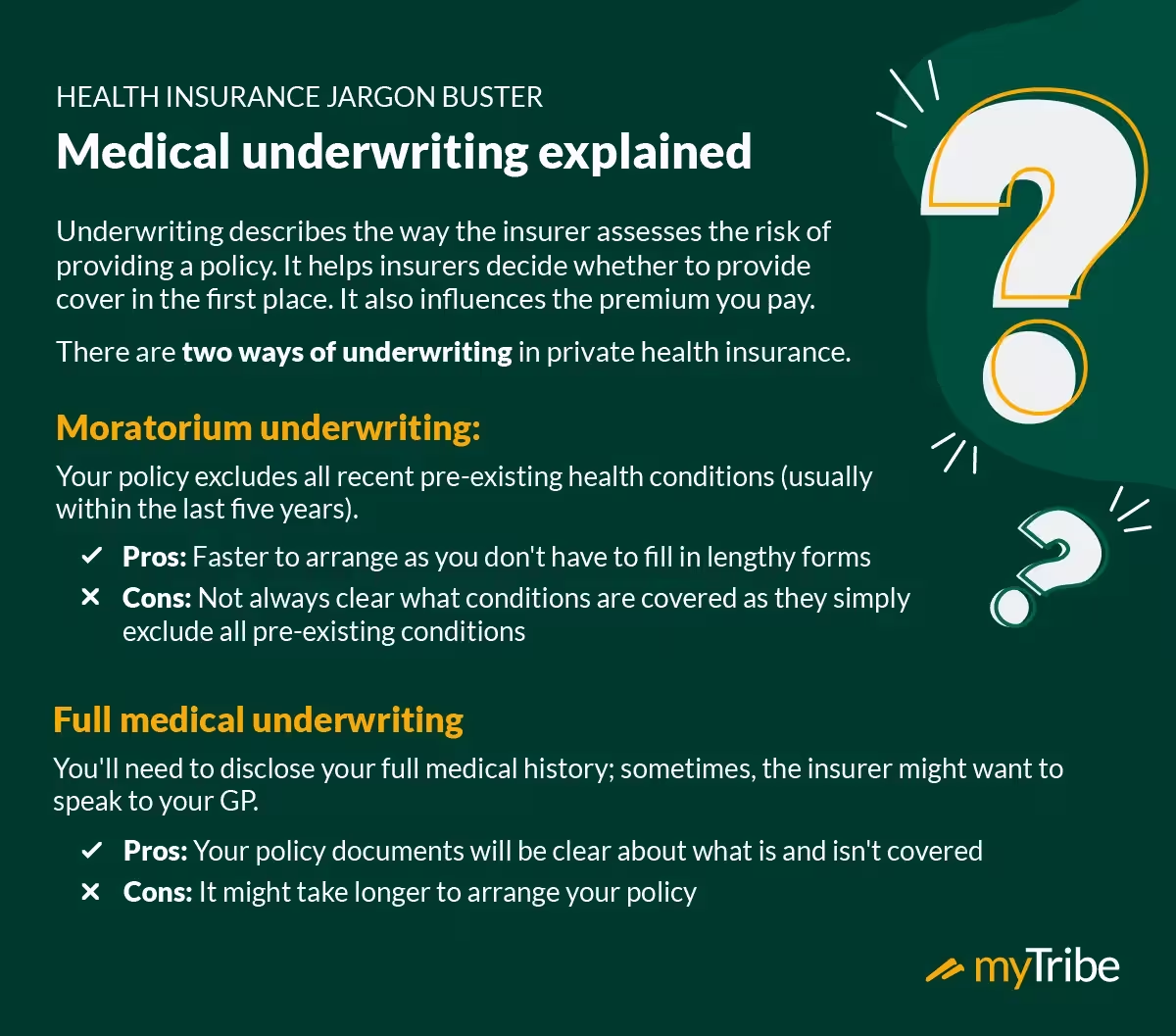Can you get health insurance with pre-existing medical conditions?
If you currently have or have had medical conditions, you may wonder whether they’ll affect your ability to get private health insurance. In this guide, we explain how pre-existing medication conditions may affect your cover, highlighting one insurer that often covers more than others.


What you need to know about health insurance and pre-existing medical conditions
A pre-existing medical condition is anything you’ve experienced symptoms of, sought advice for or had treated in the past.
Pre-existing conditions don’t stop you from taking out a health insurance policy, but depending on your underwriting method they may be automatically excluded if they occurred in the past five years.
In most cases, insurers will also exclude any conditions that are related to your pre-existing condition (harsh, we know!).
The Exeter may be the best health insurance provider when it comes to how your medical history affects your cover levels. They are widely regarded among the many expert brokers we speak with as the fairest, often covering more conditions relating to pre-existing ones than others.
If you’re here and wondering if you took out a policy today, whether an insurer will cover the cost of private treatment for something you’re currently suffering with, we need to be straight with you. No, they won’t, and your best bet, if you have the financial means, would be speak to private healthcare providers about self-paying for treatment.
That said, even if you have pre-existing conditions, health insurance is still valuable and will ensure that future medical concerns can be dealt with swiftly.
Why it's always wise to compare before you buy
Buying directly from an insurer may seem simpler, but there are downsides you should be aware of. Their online quote systems rarely show all available plan options, and if you speak with them, they can only tell you about their own products, not advise you based on your situation.
An experienced broker can show you the full picture and help you find the right cover at the best price.
When you compare through myTribe, we match you with a health insurance broker that is vetted and actively monitored for customer satisfaction, speed and reliability of communications, and knowledge, so you get a genuine product expert helping you, not just a sales call. To get a personalised market comparison, please click below, and remember to let us know how you get on.

Technically, a pre-existing medical condition is anything you’ve suffered from, had treatment for, or sought advice about in the past, and unless you’re something of a super-human, you’ve likely got at least a couple.
When it comes to health insurance, you usually only need to worry about those you’ve suffered from in the past five years, thanks to how Moratorium underwriting works.
Yes, you can get private health insurance if you have pre-existing medical conditions, but anything you’re currently suffering from or have suffered from in the last five years will likely be excluded.
Will my insurer ever cover pre-existing conditions?
After getting a private medical insurance policy with moratorium underwriting, should that condition fully resolve for two continuous years; without having symptoms, or needing medical advice or treatment for that condition, then that condition will automatically be covered should it reoccur after that clear period. So yes, if the condition goes away, it’ll likely be covered in the future.
A chronic medical condition is one that, by its nature, can’t be recovered from and instead requires life-long monitoring and management. All health insurance policies exclude chronic medical conditions, regardless of whether they start before or after you get a policy. However, some will occasionally pay for the treatment of acute flare-ups of the chronic condition but not the ongoing monitoring and management.
If you have out-patient cover, your insurer will often cover the cost of being diagnosed privately, as it could be something other than a chronic condition causing your symptoms. But, as soon as it’s established that it is chronic and not an acute medical condition, you’ll be referred to the NHS for ongoing management.
Examples of chronic medical conditions:
- Diabetes
- Asthma
- Chronic fatigue
- Irritable bowel syndrome
Again, like with pre-existing conditions, while chronic illnesses are excluded, you can still get or keep a health insurance policy, as many people do, it’s just that your chronic illness, and likely anything related to it, will be excluded from cover.
Currently, the best and fairest health insurance provider for pre-existing medical conditions is The Exeter and their Health+ policy.
Whether you opt for their Full Medical Underwriting or Moratorium Underwriting, you’ll usually find that they will cover more conditions related to pre-existing and chronic conditions than others.
Exeter will still exclude the actual pre-existing or chronic condition; it’s just that they don’t usually exclude many, if any, related conditions.
Strangely, The Exeter is somewhat shy about this unique selling point, and you won’t find anything about it on their website or in their policy documents. However, we’ve heard from numerous brokers and even The Exeter themselves that it’s true.
Indeed, in May 2024, we received a document that came from The Exeter stating:
*myTribe was given this information in May 2024. While it is our understanding when writing this article, The Exeter could change or withdraw this benefit anytime for new customers
So why isn’t it on their website or in their terms?
Only The Exeter knows why this isn’t being more publically pushed, as it’s a huge selling point and a significant differentiator between them and the rest of the market. They are telling brokers but not including it in their terms or policy documentation. So, some care is needed when buying a policy.
For people taking out a new health insurance policy, there are usually two choices when it comes to underwriting, which, as a reminder, is the process the insurer goes through to determine what it will and won’t cover.
- Moratorium Underwriting - as explained earlier, this is the simplest option, and most new policies use this type of underwriting. The added benefit of moratorium underwriting is that if pre-existing conditions get better, and don’t cause ongoing symptoms or need treatment for two years, they’ll become covered into the future. The disadvantage is that as the initial exclusion is “Any pre-existing conditions in the past five years”, along with related conditions often being excluded too, you don’t get clarity when taking out the policy of precisely what isn’t covered, and that might only be learnt when you need to claim.
- Full Medical Underwriting - the alternative to moratorium underwriting is Full Medical Underwriting, where you complete a detailed medical questionnaire before getting the policy, and your insurer will let you know precisely what will and won’t be covered. Again, The Exeter are strong when it comes to this type of underwriting, often excluding less related conditions than others. The main disadvantage of Full Medical Underwriting is that once you have an exclusion on your policy for a pre-existing condition, even if you go symptom-free for several years, it’s unlikely to be removed from the policy unless you go through the underwriting process again or appeal it at renewal (which is not always possible).
There’s no categorical “best” type of underwriting, as it’ll depend on your circumstances and medical history, but it should be high on your agenda to raise with your health insurance broker, as the decision you make today can affect cover levels for many years.

Pre-existing medical conditions don’t usually affect the cost of your health insurance. The insurer effectively removes any risk associated with the condition by excluding them, so there is no need to charge you more.
While strictly speaking, your health insurance won’t cost more, as you’ll have exclusions, you will be essentially paying the same as someone without those exclusions, so it could be argued that you’re paying the same for less.
If you have pre-existing conditions, we strongly recommend that you consult a health insurance broker (request a quote from us to speak with one for free). They will be able to help you choose the best type of underwriting, compare leading providers, and determine which insurer is best based on your circumstances and requirements.
Tips for finding the right health insurance with pre-existing conditions:
- Which type of underwriting is best for you
- Which insurer offers the most cover based on your medical history
- What are the benefits of each insurer and any disadvantages
- Which insurers are fairest when it comes to how claims affect premiums
- Which insurers have the best claims and customer service levels
What our readers say
We are rated Excellent on Google from 150+ reviews. Our reviews relate to the service provided by both myTribe and its partners.
Disclaimer: This information is general, and what is best for you will depend on your personal circumstances. Please speak with a financial adviser or do your own research before making a decision. The brokers we work with provide a comparison service from a panel of some of the UK’s top health insurers. Not every broker works with all the insurers listed in our guides.










